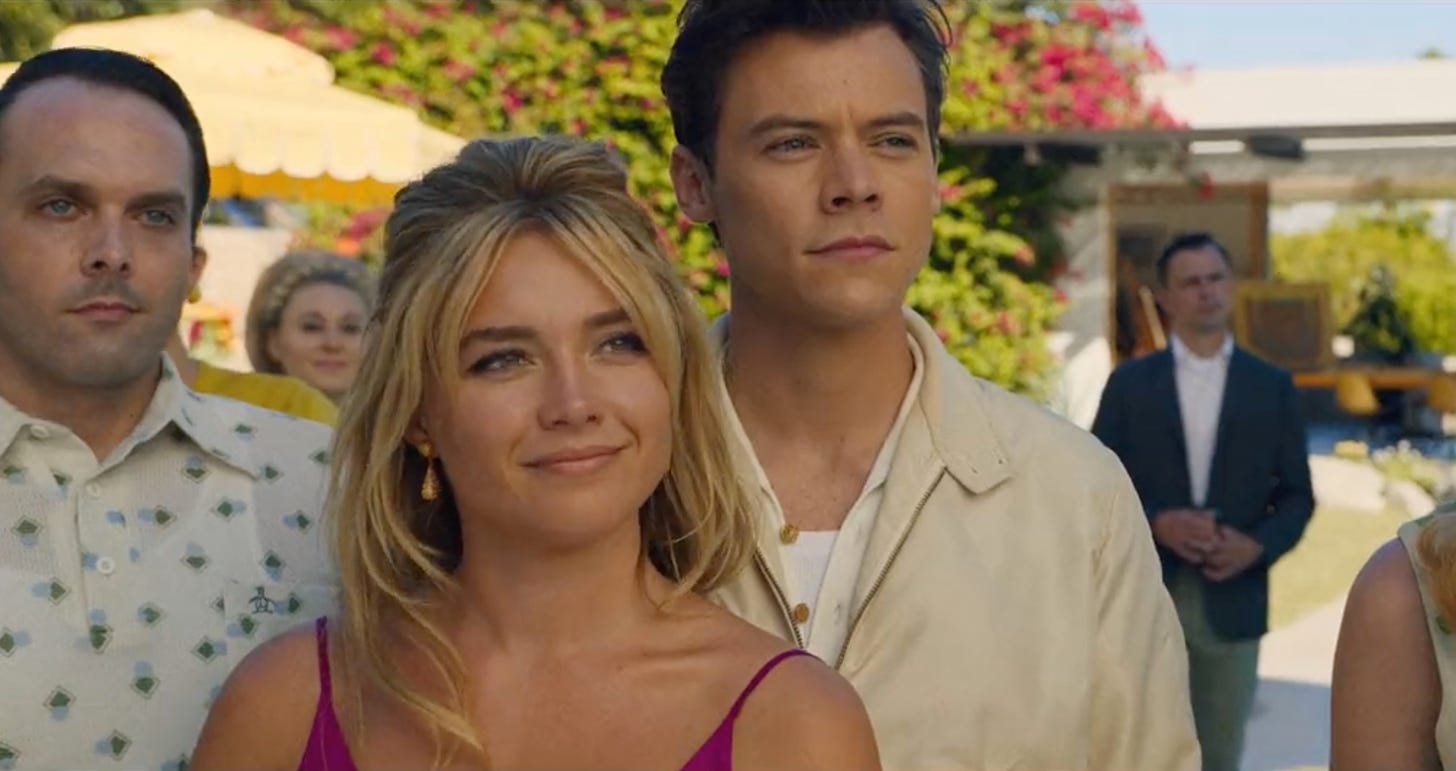In Review: 'Don't Worry Darling'
An Eisenhower-era utopia enters The Twilight Zone in Olivia Wilde's calamitous follow-up to 'Booksmart.'
Don’t Worry Darling
Dir. Olivia Wilde
123 min.
It takes a while for Don’t Worry Darling to reveal itself as abysmal, because it spends such a grueling amount of time being merely pedestrian, planting the seeds for the twist that will knock it wildly off course. Set in the candy-colored Twilight Zone of Victory, California, an experimental community that reads like an eerily crystalline vision of the Eisenhower ’50s, the film offers a conformist utopia of prefab houses and lush, manicured lawns. Every morning, the wives follow their husbands out to the car, wave as they drive away in migratory formation, and retreat back to their homes for housework, perhaps emerging later in the day for a little light gossip. It’s a highly artificial environment, a utopia carved out in the desert, with no evident connection to the outside world.
Written by Kate Silberman and directed by Olivia Wilde, the team behind the energetic but facile comedy Booksmart, Don’t Worry Darling doesn’t waste much time pretending nothing is amiss in Victory, but those cracks in the facade take a while to spider out and finally shatter. Against this backdrop, Florence Pugh really pops as Alice, whose passion for her husband Jack (Harry Styles) sustains a domestic fantasy that’s otherwise short on stimulation. Without kids to occupy their time and thoughts, Alice and Jack share a robust sex life and a stress-free routine that a thoroughly unreflective woman might enjoy. But Alice is not a Stepford wife type. She struggles in the role she’s been asked to play.
And so, Don’t Worry Darling becomes a grueling wait for that other shoe to drop, with Wilde alternating scenes of a vacant paradise with escalating shocks to the system. The only interesting wrinkle is that Victory is understood as a group project, like mid-20th century suburban pilgrims realizing conventional values in their purest form. It also helps that Chris Pine, as the leader of this initiative, gives the only compelling performance besides Pugh’s, holding court with the serene self-confidence of the truly diabolical. He has answers to every question and, behind the scenes, answers to every threat, too. To him, Victory isn’t just a community— it’s a philosophy.
Every beat of this story will feel familiar to even the most casual science-fiction fan, to the point where naming any one of the many films it resembles will give the game away. Beyond the smaller quibbles about the slack pacing, the thematic obviousness and the variable performances—Styles is the classic example of a musician whose stage magnetism collapses on screen—Don’t Worry Darling doesn’t expose itself as an outright calamity until all its cards are on the table. Once all those teasing questions about Victory finally get answered, they prompt a whole new round of questions, most of them rhetorical. (Sample questions: “Seriously?” “How could that possibly work?” “Are you kidding me with this shit?”) There’s a message here about modern gender roles and reactionary politics, but Don’t Worry Darling is a fake-prestige movie, as vacuously embroidered as the world it’s trying to evoke.
Don’t Worry Darling opens in theaters everywhere tomorrow.






That first line is killer, but I still can't wait to see this thing.
I had that feeling after seeing the trailer a couple times that I was already getting everything the movie had to offer. This seems to confirm it. Does it help or advance the struggle against very real current problems to keep recasting things to the mythical Eisenhower era? I realize that the people causing those very real problems hold that era up as a gold standard, but on a practical level, does the use of that frame really mean anything to anyone younger than almost dead today? It strikes me as a dusty cry against a very real threat.